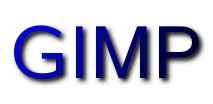| 16.5. Basic I & II | ||
|---|---|---|

|
16. Alpha to Logo Filters |  |
These filters add a gradient effect to the alpha channel of active layer as well as a drop shadow and a background layer.
The “Basic II” also adds a highlight layer.
![[Warning]](images/warning.png)
|
Warning |
|---|---|
|
The image will always be resized to the active layer's size. |
The filters are derived from the “Basic I” and “Basic II” logo scripts (see → → ), which draw a text with the filter effect, e.g.

The “Basic I” logo script.
This color is used to fill the background layer created by the filter. It defaults to white. When you click on the color swatch button, a color selector pops up where you can select any other color.
The name of this option refers to the text color of the logo scripts that were mentioned above. Here this color — by default blue (6,6,206) for “Basic I” and red (206,6,50) for “Basic II” — sets the basic color of the gradient effect: this is the color the alpha channel will be filled with before the gradient effect will be applied.
You can reproduce the gradient effect manually by using the Blend tool with the following options:
Mode: Multiply,
Gradient: FG to BG (RGB), where FG is white and BG is black,
Offset: 20,
Shape: Radial,
Dithering: checked.